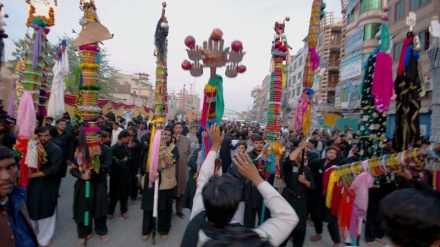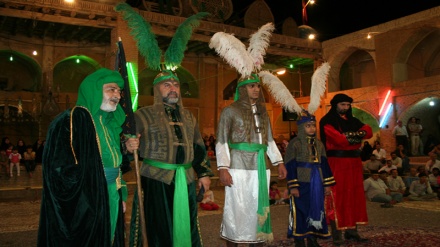Muharram mourning traditions in different lands - 4
Today, we continue our discussion on the evolution of the mourning ceremonies in Syria, following the arrival in Damascus of the Caravan of Noble Captives, after the tragedy.
If you might recall, yesterday we said the people of Syria who were raised on a diet of propaganda against the Prophet’s Ahl al-Bayt by the charlatan Mu’awiya ibn Abu Sufyan, during his almost 40-year long stranglehold on that land, had no idea of the identity of Imam Husain (AS), but whenever someone realized the fact that he was the grandson of the Prophet of Islam and was cruelly martyred by Yazid, they wept and lamented. When the noble captives were taken in chains to the court of the tyrant Yazid, they saw him sitting on a throne while in front of him lay in a golden tray the head of Imam Husain (AS). He had a cane in his hand and was showing disrespect to the severed head. The tyrant was elated and openly wished that if his infidel ancestors who in trying to attack the Prophet of Islam, had been slain in the Battles of Badr and Ohod were alive today to witness how he had humiliated the Prophet’s Household. He went on to recite a couplet as further proof of his lack of faith in Islam, saying: The Hashemites played the game of kingdom; neither any message descended from heaven nor revelation. Hazrat Zainab (SA) could no longer bear the sight of the accursed Yazid disrespecting the head of her brother Imam Husain (AS) by striking the lips with a cane. As her grief-stricken younger sister Umm Kulthoum (SA) flung herself on the head of her brother, Hazrat Zainab (SA) started one of her most eloquent sermons that had a profound effect on the gathering:
She said:
“O Yazid! You think that you have made our life miserable and existence unbearable and you have made us prisoners, and because we have been presented in your court you feel elated. You think that we have been disrespected and dishonoured by God and that you have been honoured and elevated to this position by Him. This apparent success of yours is the result of your worldly might and this makes you puffed with pride at our disaster. You feel that you have conquered the whole world and feel that you are well set in power and control. Only time will teach you a bitter lesson.
“O Yazid, you have done what you wished to do, but remember that you are doomed to perish and you will be cut to pieces. Then (on the Day of Judgement) you will be taken in to the presence of the Prophet and you will be burned with the sins you have committed by shedding the blood of his progeny and dishonouring the sanctity of his family. You will be taken in the presence of the Prophet to a place where his family members will be gathered and you will undergo a horrible punishment and then there will be no escape for you and your companions.”
When the court preacher mounted the pulpit and poured venom on the Prophet’s Ahl al-Bayt, Imam Zain al-Abedin (AS), as the son and successor of the Martyr of Karbala, sought permission to ascend what he called planks of wood, since the pulpit in Yazid’s court had lost its sanctity and was being used to break the laws of Islam. A fearful Yazid initially refused, aware of the consequences, but when pressed by the courtiers, he relented. Thereupon, Imam Zain al-Abedin (AS) ascended it and delivered a memorable sermon that shook the Omayyad regime to its very foundations.
Part of the Imam’s sermon said: “Whoever know me knows me, and whoever does not know, let him be informed about me and the family to which I belong. I am the son of Mohammed al-Mustafa; I am the son of Ali al-Murtaza; I am the son of the best of the believers, the heir of the prophets, the destroyer of the unbelievers, the Commander of the Muslims, the light of the mujahidin, the ornament of the worshippers, the crown of the weepers, the most patient of the patient, and the best of the steadfast from among the family of Yasin. I am the son of Fatema, the noblest lady of the world.”
The effect of the Imam’s speech was so powerful that everybody in the court began to weep and blame Yazid, who now became afraid that if the Imam continued his speech, there would be an uprising against him. He, therefore, ordered the Azaan or call to prayer be recited, although it was not yet time for the ritual prayer. When the Muezzen said "Allahu Akbar", the Imam testified Allah’s Greatness. When the Muazzen said, "Ash hadu anna Mohammadan Rasoolullah", the Imam turned to Yazid and asked him: “Tell me O Yazid, was Mohammad your grandfather or mine? If you say he was your grandfather, it would be an open lie, and if you say he was my grandfather then why have you killed his son and imprisoned his family? Why have you killed my father and brought his family to this city as prisoners?”
Yazid, faced with growing discontent was forced to release the noble captives and allowed them to go wherever they liked.
Upon release from captivity, and after losing to the cold hands of death her 4-year old niece Ruqayya who could no longer bear the sufferings of imprisonment, the first act by Hazrat Zainab (SA) was to organize the first ever formal mourning ceremony for her martyred brother. She called for a house to be set apart for the commemoration and when the ladies of Damascus came to offer their condolences, bedecked in all their finery, she turned them away, saying this was not the way to mourn the tragic martyrdom of Imam Husain (AS). They returned after changing into black attire and divesting themselves of all their ornaments. This was the first-ever formal commemoration ceremony in history for the tragedy of Karbala. Hazrat Zainab (SA) thus laid the foundations of the Majales-e Aza or mourning gatherings for Imam Husain (AS), a practice the faithful have continued to observe throughout the world ever since in order to infuse life into society by reviving memories of the tragic course of events and the heroic dimensions of the Epic of Ashura and its aftermath.
MD/AS/SS


